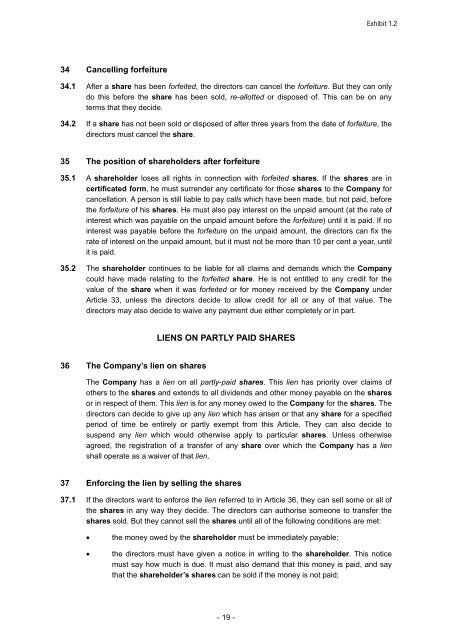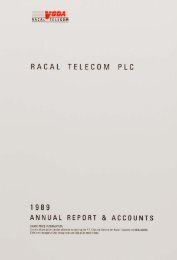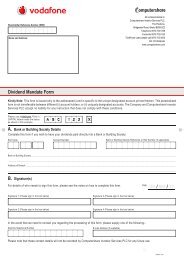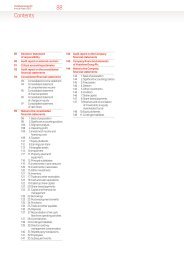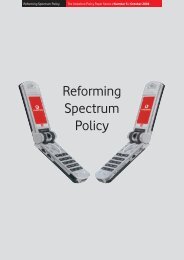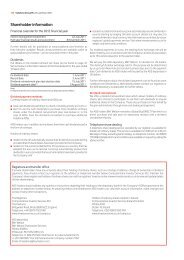- Page 1 and 2:
UNITED STATES SECURITIES AND EXCHAN
- Page 3 and 4:
Vodafone Group Plc Annual Report on
- Page 5 and 6:
For more information, visit: www.vo
- Page 7 and 8:
Proportionate mobile customers 341.
- Page 9 and 10:
Product focus: Vodafone 360 Samsung
- Page 11 and 12:
“ We have improved our commercial
- Page 13 and 14:
Our strategy The key focus of our s
- Page 15 and 16:
Regions Revenue (1) (£bn) 8.0 6.5
- Page 17 and 18:
Vodafone branded franchise stores 7
- Page 19 and 20:
Total communications services We ha
- Page 21 and 22:
Mobile broadband solutions 7 Causes
- Page 23 and 24:
Customer devices Access and transmi
- Page 25 and 26:
Proportion of new radio sites share
- Page 27 and 28:
Employees by location 7 6 1 1. Germ
- Page 29 and 30:
Operating results Performance This
- Page 31 and 32:
Performance Europe (1) Germany Ital
- Page 33 and 34:
Other Africa and Central Europe Ser
- Page 35 and 36:
Performance 2009 financial year com
- Page 37 and 38:
Europe Performance Germany Italy Sp
- Page 39 and 40:
Other Africa and Central Europe Ser
- Page 41 and 42:
Guidance 2011 financial year and th
- Page 43 and 44:
as intensifying competition, pricin
- Page 45 and 46:
We provide returns to shareholders
- Page 47 and 48:
At 31 March 2010 we had £4,423 mil
- Page 49 and 50:
Corporate responsibility Performanc
- Page 51 and 52:
platform which aims to meet the exp
- Page 53 and 54:
8 9 10 11 12 13 14 audit team and i
- Page 55 and 56:
Corporate governance In March 2010
- Page 57 and 58:
Re-election of directors Although n
- Page 59 and 60:
Monitoring and review activities Th
- Page 61 and 62:
Directors’ remuneration Dear Shar
- Page 63 and 64:
The remuneration package The table
- Page 65 and 66:
Awards made to executive directors
- Page 67 and 68:
Audited information for executive d
- Page 69 and 70:
Governance Share options No options
- Page 71 and 72:
Beneficial interests Governance The
- Page 73 and 74:
Directors’ statement of responsib
- Page 75 and 76:
Critical accounting estimates The G
- Page 77 and 78:
Report of independent registered pu
- Page 79 and 80:
Consolidated statement of financial
- Page 81 and 82:
Consolidated statement of cash flow
- Page 83 and 84:
All intra-group transactions, balan
- Page 85 and 86:
Revenue from interconnect fees is r
- Page 87 and 88:
Fair value hedges The Group’s pol
- Page 89 and 90:
Financials A reconciliation of adju
- Page 91 and 92:
5. Investment income and financing
- Page 93 and 94:
Deferred tax Analysis of movements
- Page 95 and 96:
9. Intangible assets Financials Lic
- Page 97 and 98:
Key assumptions used in the value i
- Page 99 and 100:
Financials Change required for carr
- Page 101 and 102:
Financials 13. Investments in joint
- Page 103 and 104:
16. Inventory Financials 2010 2009
- Page 105 and 106:
20. Share-based payments The Compan
- Page 107 and 108:
21. Capital and financial risk mana
- Page 109 and 110:
22. Borrowings Carrying value and f
- Page 111 and 112:
Financials Maturity of borrowings T
- Page 113 and 114:
23. Post employment benefits Backgr
- Page 115 and 116:
History of experience adjustments F
- Page 117 and 118:
Financials Pro-forma full year info
- Page 119 and 120:
in respect of mobile phones purchas
- Page 121 and 122:
Financials Transactions with direct
- Page 123 and 124:
Company financial statements of Vod
- Page 125 and 126:
Financials Fair value hedges The Co
- Page 127 and 128:
8. Share-based payments The Company
- Page 129 and 130:
Shareholder information Financial c
- Page 131 and 132:
The current authorised share capita
- Page 133 and 134:
Pre-emptive rights and new issues o
- Page 135 and 136:
Additional tax considerations UK in
- Page 137 and 138:
Regulation Our operating companies
- Page 139 and 140:
Ghana In May 2009 the Government of
- Page 141 and 142:
Reconciliation of organic growth to
- Page 143 and 144:
Additional information Item Form 20
- Page 145 and 146:
Definition of terms Additional info
- Page 147 and 148:
Notes Financials Vodafone Group Plc
- Page 149 and 150:
Contact details Investor Relations
- Page 151 and 152:
Events occurring subsequent to the
- Page 153 and 154:
Table of Contents Cellco Partnershi
- Page 155 and 156:
Consolidated Balance Sheets Cellco
- Page 157 and 158:
Consolidated Statements of Changes
- Page 159 and 160:
Vendor Rebates and Discounts The Pa
- Page 161 and 162: Derivatives The Partnership uses de
- Page 163 and 164: 2. Acquisitions Acquisition of Allt
- Page 165 and 166: Acquisition of Rural Cellular Corpo
- Page 167 and 168: 4. Fair Value Measurements The foll
- Page 169 and 170: 6. Supplementary Financial Informat
- Page 171 and 172: 7. Debt (dollars in millions) Matur
- Page 173 and 174: Maturities of Long-Term Debt Maturi
- Page 175 and 176: The Partnership had approximately 5
- Page 177 and 178: The Partnership or its subsidiaries
- Page 179 and 180: 14. Subsequent Events Distributions
- Page 181 and 182: ADR Payment Information Fees payabl
- Page 183 and 184: SIGNATURE The registrant hereby cer
- Page 185 and 186: 4.8 Vodafone Group 1998 Company Sha
- Page 187 and 188: Company Number: 1833679 The Compani
- Page 189 and 190: - ii - Article No. Page No. Sums wh
- Page 191 and 192: - iv - Article No. Page No. Eligibi
- Page 193 and 194: - vi - Article No. Page No. Minutes
- Page 195 and 196: Company Number: 1833679 The Compani
- Page 197 and 198: Words and Phrases Meaning Borrowing
- Page 199 and 200: Words and Phrases Meaning Registere
- Page 201 and 202: same in the Articles, unless the Ar
- Page 203 and 204: • any arrears of dividend on any
- Page 205 and 206: 11.2 So far as the Companies Acts a
- Page 207 and 208: • sell any fractions of equity se
- Page 209 and 210: 21 Certificates SHARE CERTIFICATES
- Page 211: • decide when and where the money
- Page 215 and 216: 40.3 All the Articles relating to G
- Page 217 and 218: 46 Overseas branch registers The Co
- Page 219 and 220: the money cannot be invested in the
- Page 221 and 222: 56.5 If there is no director presen
- Page 223 and 224: • at least two shareholders at th
- Page 225 and 226: and all other sums, relating to the
- Page 227 and 228: exchange or any other stock exchang
- Page 229 and 230: 77 Delivering proxy forms 77.1 The
- Page 231 and 232: of the General Meeting decides that
- Page 233 and 234: Article, this does not prejudice an
- Page 235 and 236: • he is prohibited from being a d
- Page 237 and 238: 105 Director’s written resolution
- Page 239 and 240: • if, or to the extent that, the
- Page 241 and 242: 110 Confidential information 110.1
- Page 243 and 244: 115 The power to establish local bo
- Page 245 and 246: • adding any amount which has bee
- Page 247 and 248: 120.2 The directors can also appoin
- Page 249 and 250: 124.2 The profits of the Company wh
- Page 251 and 252: 130.3 An amount credited to an acco
- Page 253 and 254: paid in a specified period. The spe
- Page 255 and 256: 136 Accounting and other records AC
- Page 257 and 258: other joint holders. For such purpo
- Page 259 and 260: 148 Minutes MINUTES AND RECORDS 148
- Page 261 and 262: 153 Indemnity DIRECTORS’ LIABILIT
- Page 263 and 264:
• may provide a director, Secreta
- Page 265 and 266:
directors) he has certain rights at
- Page 267 and 268:
• represented by Share Warrants w
- Page 269 and 270:
ecause the total number of shares i
- Page 271 and 272:
174 Capital 174.1 If the Company is
- Page 273 and 274:
179 Class Rights 179.1 The Company
- Page 275 and 276:
188 Transfer and purchase The Compa
- Page 277 and 278:
About the glossary Glossary This gl
- Page 279 and 280:
instruments Formal legal documents.
- Page 281 and 282:
transfers the right to be registere
- Page 283 and 284:
CONFORMED COPY 11398-03456 ICM:8658
- Page 285 and 286:
(B) On the date hereof the Issuer p
- Page 287 and 288:
Schedule 1 Terms and Conditions of
- Page 289 and 290:
and settling of transactions in tho
- Page 291 and 292:
3 Status of the Notes The Notes and
- Page 293 and 294:
(3) the relevant Reset Date is eith
- Page 295 and 296:
(vi) if “30E/360 (ISDA)” is spe
- Page 297 and 298:
(c) Payments in respect of Register
- Page 299 and 300:
6 Redemption and Purchase (a) Redem
- Page 301 and 302:
7 Taxation All payments in respect
- Page 303 and 304:
10 Replacement of Notes, Certificat
- Page 305 and 306:
For the purposes of this Condition
- Page 307 and 308:
If the Final Terms indicates that t
- Page 309 and 310:
This Global Note does not confer on
- Page 311 and 312:
Date made Interest Payment Date Sch
- Page 313 and 314:
Date made Total amount of principal
- Page 315 and 316:
Schedule Two* EXCHANGES FOR DEFINIT
- Page 317 and 318:
PART 2 FORM OF PERMANENT GLOBAL NOT
- Page 319 and 320:
(a) if specified in the applicable
- Page 321 and 322:
IN WITNESS whereof the Issuer has c
- Page 323 and 324:
Date made PART II PAYMENT OF INSTAL
- Page 325 and 326:
Date made PART IV PURCHASES AND CAN
- Page 327 and 328:
ANNEX [attach the Final Terms that
- Page 329 and 330:
provided in the Conditions and the
- Page 331 and 332:
For value received the undersigned
- Page 333 and 334:
PART 4 FORM OF DTC RESTRICTED GLOBA
- Page 335 and 336:
Interests in a DTC Restricted Globa
- Page 337 and 338:
For value received the undersigned
- Page 339 and 340:
On the front: PART 5 FORM OF REGULA
- Page 341 and 342:
On the back: Terms and Conditions o
- Page 343 and 344:
For value received the undersigned
- Page 345 and 346:
The Issuer, subject to and in accor
- Page 347 and 348:
Final Terms [Here to be set out the
- Page 349 and 350:
Executed as a deed by VODAFONE GROU
- Page 351 and 352:
Exhibit 4.25
- Page 353 and 354:
Exhibit 4.25
- Page 355 and 356:
Exhibit 4.26
- Page 357 and 358:
Exhibit 4.27
- Page 359 and 360:
Exhibit 4.27
- Page 361 and 362:
(v) Liability incurred in connectio
- Page 363 and 364:
Stephen Scott Group General Counsel
- Page 365 and 366:
Appendix Section 661 (3) and (4) Co
- Page 367 and 368:
(v) Liability incurred in connectio
- Page 369 and 370:
UNAUDITED COMPUTATION OF RATIO OF E
- Page 371 and 372:
I, Andy N. Halford, certify that: R
- Page 373 and 374:
CONSENT OF INDEPENDENT REGISTERED P
- Page 375:
CAPITALIZATION AND INDEBTEDNESS Exh


